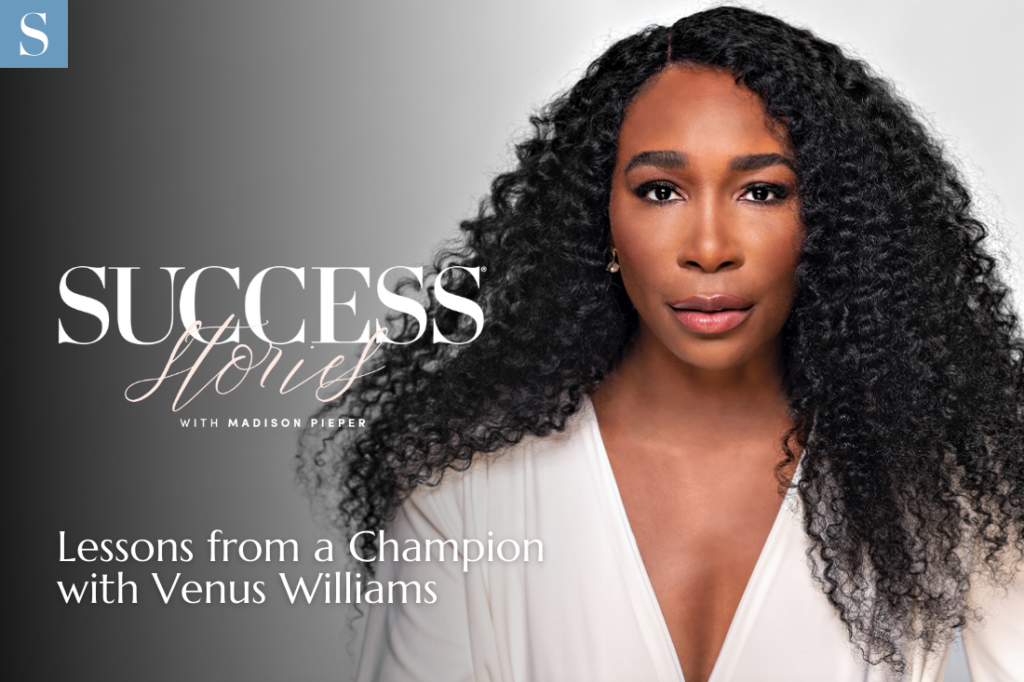The lessons you learn playing sports can translate into many other areas of life—especially business.
Venus Williams knows more about playing tennis than most people on Earth. She’s won 23 Grand Slams, including seven singles tournaments, and four Olympic gold medals. And she applies the skills she honed over more than two decades on the court to her business interests.
In 2007, Williams founded athletic fashion line EleVen. She’s also on the board of HumanCo, which invests in brands that promote sustainability and healthier living. And in 2009, she became a minority owner of the Miami Dolphins.
“You learn everything in sports, without even knowing that you’re learning,” Williams says. “I’ve learned how to win, how to lose, how to set new goals, how to deal with [myself], how to deal with others—all of that stuff. It’s so funny: I picked up this book once, by a renowned business school, about how to be resilient. I was like, ‘Oh, I learned that [playing tennis]!’”
In this episode of SUCCESS Stories, Williams tells SUCCESS’s Madison Pieper about not getting distracted by other people’s expectations, being vigilant about her mental health and why being honest is easier in the long run.
Make your goals about you.
Paying too much attention to other people’s expectations can cloud your vision. When you focus on what everyone else thinks you should do, it’s hard to know whether the goals you’re working on are what you want or what you think you should want.
Having spent her life in the public eye, Williams has felt this pressure on a much larger scale. She has the media, fans and self-proclaimed tennis experts all chipping in with opinions on her career and even her personal life.
Despite this deluge of attention, Williams says she’s always played tennis for herself.
“My parents taught us early on that you have to do this for yourself: you’re not doing it for anyone else,” she says. She regularly takes introspective time to make sure that she’s centering her own voice.
“I found myself this year checking in with myself and realizing, ‘Oh my gosh: I’ve started to care about what other people might think of my results, or whatever it is,’” Williams says. “And going back to that freeness of really letting it be about you, and not everyone else.”
People will have opinions, whether it’s about your work or your personal life. That’s true even if you aren’t a world-famous athlete: It could be your family, friends or colleagues who are pressuring you to take a certain path that you aren’t sure about. Only you get to make the final decision.
Look after your mental health before it’s urgent.
Proactively caring for your mental health needs to be an ongoing process that you build on and maintain, even when you feel good. Don’t wait until you’re in a crisis before adding tools to your toolbox.
This is true for everyone, but especially for people who push themselves to take on difficult challenges. That includes entrepreneurs and other leaders, as well as professional athletes, especially in solo sports.
It can be lonely being the person in charge. Shouldering responsibility for your own success or failure frees you up from meeting other people’s expectations, but it also comes with a lot of stress.
You need to be able to manage stress continuously. “I find—especially in those moments where you’re by yourself—that you need to do that work in advance,” Williams says. “It’s not, ‘OK, now I’ve had a breakdown I’m going to do it:’ You’re actually doing that work every week, so you can hopefully stay in that good place.”
Just like athletes train for competitions, consistently working on techniques that improve your mental health will ensure you’re better prepared when you really need help.
Don’t be afraid to be honest.
When you have a need or a desire, speak up about it honestly. Partly because that’s often the only way to make other people aware of it. But also because pretending otherwise is exhausting and creates more problems later.
“When you don’t want to do something but you avoid it, or you say, ‘Yeah, I’m going to do it,’ but you’re just going to tell him later that you’re not going to do it—this is all so convoluted,” Williams says. “Just say, ‘I can’t.’ Be honest and set those expectations: it’s so freeing.”
Yes, honest conversations can be difficult. But avoiding the truth only creates more issues, and ensures you definitely won’t get what you want without hurting some feelings.
Taking responsibility for your life and your choices means claiming power. It also means you’re the one who has to make difficult decisions, and stand firm. Give yourself the tools you’ll need, trust in your own abilities and advocate for yourself.
“Always bet on yourself,” Williams says. “That’s your best bet. Don’t bet on anyone else. Don’t believe anyone else more than you. Take that chance; it’s the best chance you’ll ever take.”
SUCCESS Stories with Madison Pieper is no longer releasing new episodes on the SUCCESS Podcast Network, but you can still listen to the full conversation below.




